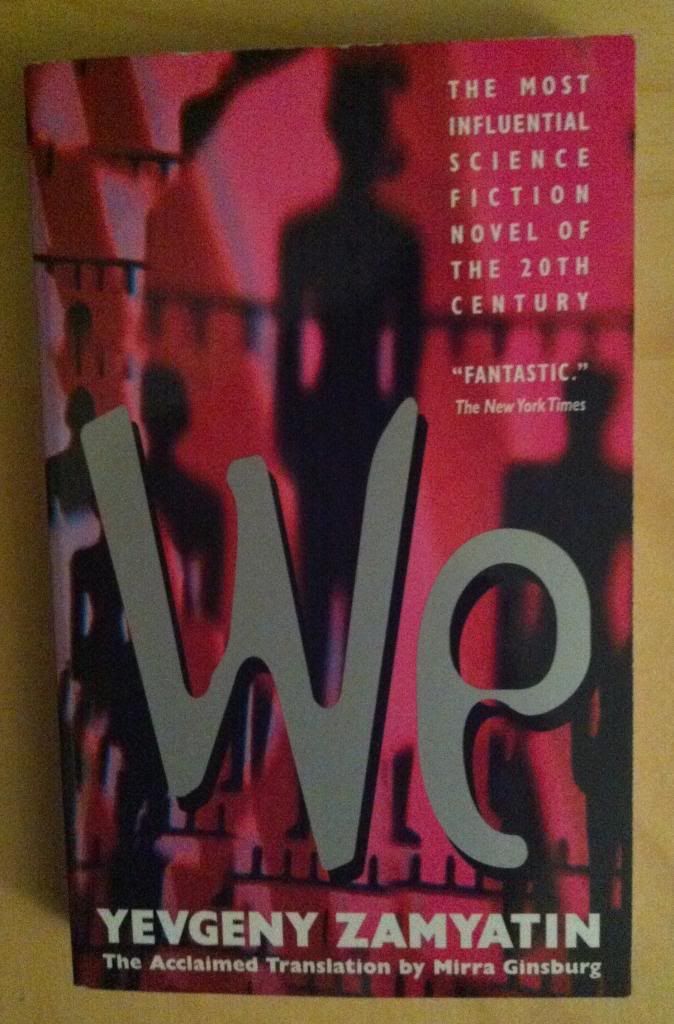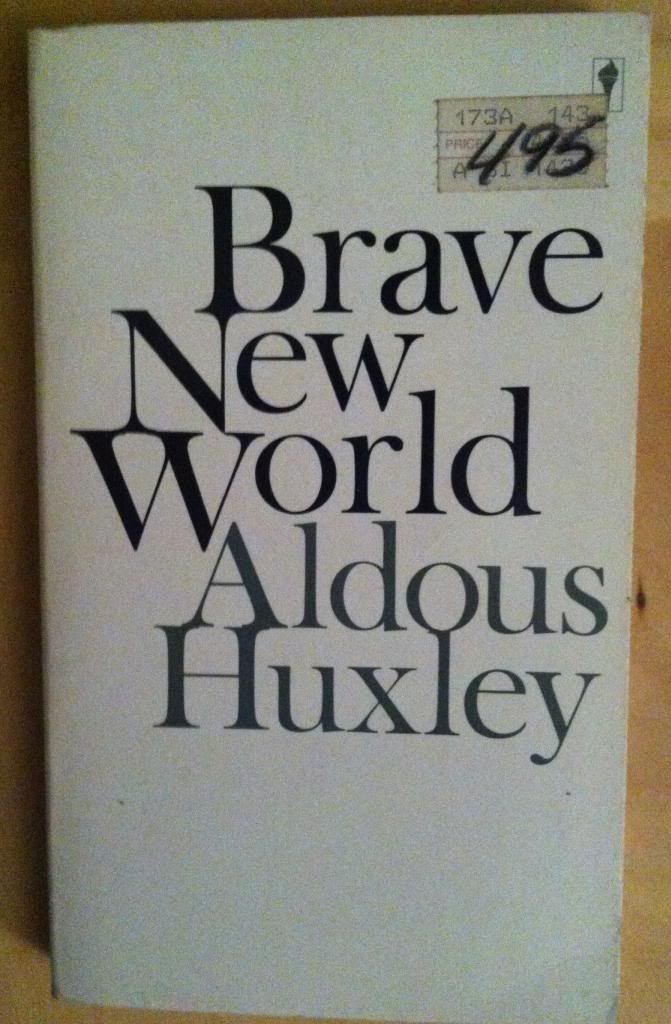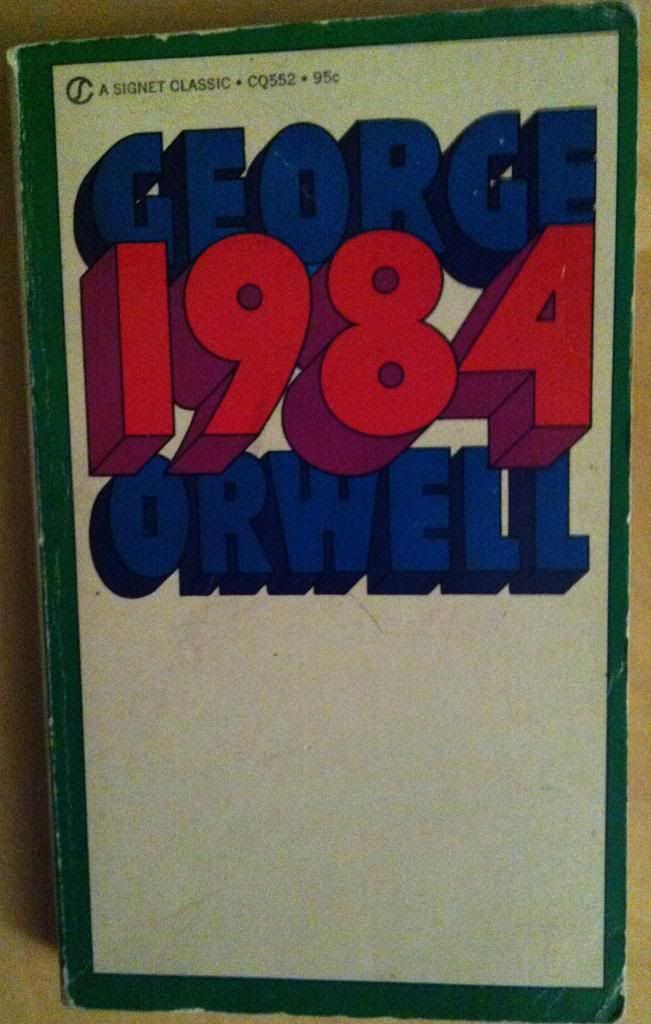Or why you should read We, by Yevgeny Zamyatin; Brave New World, by Aldous Huxley; and 1984, by George Orwell
In these times of mature political systems lumbering, at once vulnerable and empowered by emergent technology, nothing says summer reading quite like Dystopian Science Fiction. Specifically, the timeless classics of We, Brave New World, and 1984, which extrapolate horrific future human societies resulting from technology and political ideology and the worst aspects of human nature. These books are brilliant literary experiments that are just as, if not more, relevant today than they were at the time they were written. They are all very good books.
We: was written by Yevgeny Zamyatin in 1921 largely in response to the various Russian Revolutions. In it, humanity lives within The One State, an urban nation founded on principles of reason and communal ownership and complete sublimation of the individual to the many and the state. The protagonist, D-503, is the head engineer of The Integral, a rocketship designed to disseminate the doctrines of The One State to other planets. We is D-503's journal and is meant to be his contribution to the mission of The Integral. In it D-503 details his life in The One State living within transparent buildings in a city cut off from the natural world, the absolute scheduling of every aspect of his life, and the systemic and regulated sexual interactions between himself and others. We meet his state-permissive lover O-90, forbidden for eugenic reasons from having children. We meet O-90's other official lover R-13, a poet who is both a friend and rival to D-503. And we meet I-330, a dangerous woman who flaunts the rules of society and sexual conduct and who seduces D-503 into questioning his belief in The One State. We becomes, then, a testament to D-503's struggle between his emotional humanity and the rational conditioning of his society as he encounters the rebel group MELPHI and the terrible lengths The One State will go to maintain order. It is a very smart, very forward thinking book.
Brave New World: was written by Aldous Huxley in 1931 and is essentially consumerist capitalism extrapolated to a dystopian nightmare. Brave New World posets a world that is all about maintaining the status quo, about regearing society to maintain the machinery of Capitalism for the happiness of all. To that end people are cloned to order, a small number of bright people to satisfy high ranking jobs and higher numbers of simple or purposefully cognitively inhibited people to conduct manufacture or menial jobs, and raised by the state perfectly conditioned to be happy with their roles within society. People are taught to purchase, purchase, purchase, and to enjoy their consumption of items and media instead of thinking. Family is abolished, sex is recreational and casual, and promiscuity is a social norm. It is against this backdrop that Bernhard Marx, an intelligent outcast, and Lenina Crowe, a beautiful and well socialized young woman, visit a Savage Reservation, home to American aboriginals living primitively and traditionally, and discover John, a naturally born son of a modern woman lost in the Reservation. They bring John back to their modern world, and the rest of the novel becomes a question of whether someone not conditioned for this society would fit in, would someone similar to us fit into this Brave New World. Brave New World is one of the smartest, most prescient things I have ever read. You really, really ought to read it.
(Incidentally Aldous Huxley's grandfather was an early Evolution theorist and contemporary of Charles Darwin, his brother Andrew Huxley won the Nobel Prize for some early and fundamental work on neurons (and theorizing the existence of ion channels! [I study an ion channel in hearts for a living.]), and his other brother was a leading figure in the Eugenics movement. Why hasn't anyone made a TV series about the Huxleys!?)
1984: was written by George Orwell in 1949 and depicts the ultimate totalitarian society. In the novel the world is split into three Superpowers locked in a state of perpetual and futile war. The novel focuses on the country of Oceania, a nation made of North and South America as well as the former British Empire, and its province of Airstrip One, which was formerly the United Kingdom. Airstrip One, and Oceania, are ruled by Ingsoc, a ruthless totalitarian regime that uses total surveillance, social conditioning, fervent patriotism, and manipulation of history and facts to maintain iron control over the ruling Party elite. Ingsoc is not satisfied merely with controlling the members of the Party but demands absolute mental obedience, conformity, and orthodoxy; anything less is thoughtcrime. It is not enough to obey Big Brother, Ingsoc's figurehead, you must LOVE him. (Ingsoc is content to ignore the squalid lowest class, the Proles, as they wield no political power.) It is in this society that Winston Smith, a discontent Outer Party member working at the Ministry of Truth (Propaganda), pursues a forbidden love affair with Julia, a pragmatic and daring younger Outer Party member, which eventually leads to the pair harbouring rebellious thoughts. 1984 is absolutely one of the most important works of fiction in the English language.
So why should we care about these very pessimistic books written a generation ago? Because they are becoming eerily true. It seems more and more that our political systems have read these books and have actively decided to adopt the practices of Ingsoc or The One State or the Brave New World. We are sitting on the edge of a panopticon where our governments are pursuing omnipresent electronic surveillance straight out of 1984 while we post about our shits on social media as if we live in the glass houses of We. Our governments seem to be approximating Ingsoc as they practice Doublethink deliberately ignore facts, demand total intellectual conformity from their members, and attempt to legislate out the sex instinct of their citizens. Meanwhile, socially, we common people seem to be approximating Brave New World as we become relentless consumers spending instead of mending as we are constantly hypnotized by ubiquitous advertisement suggestions and media. Our sex has become more casual and prominent, while the Soma of our distractions, electronic and chemical and otherwise is always growing. We have lashed ourselves to progress, rapidly changing our behaviour, and maybe moving further and further away from our natural humanity like the Numbers of We. The parallels between our society and these novels are legion and they are chilling. We should care about these classic dystopian novels because they make very smart, very pertinent statements about the social challenges we are facing right now.
I can recommend all three of these books without reservation. They are absolutely brilliant and absolutely worth reading. Just know that they are heavy and thoughtful and that you need to go into them with an open and active mind. Also, while this should be no barrier for trying We, it is translated from Russian, and the particular version I read was a bit strained at times linguistically.
You can read Brave New World for free here. You can read We for free here. You can read 1984 for free here (although it is a bit buggy). (Disclaimer: I am unsure of the legal status of these sites and would regularly hesitate to do this, but I'm sharing links because 1) the authors involved are no longer alive and 2) I feel that the value of these novels to our current poltical/social discussion warrants sharing the works. Please purchase the books with cash money if you are at all so inclined.)



No comments:
Post a Comment